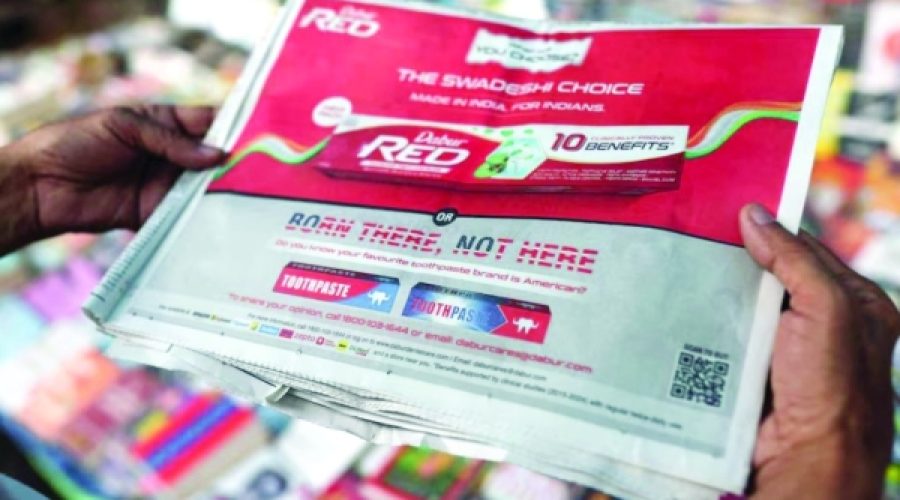رسوم معجون الأسنان والتوترات التجارية: كيف يمكن أن تؤثر النزاعات بين الولايات المتحدة والهند على استثماراتك التجارية؟
تشيناي: تستغل شركة دابور، الشركة الهندية الرائدة في مجال السلع الاستهلاكية والمنافسة لشركة كولجيت-بالموليف، تنامي المشاعر القومية من خلال الترويج لمعجون أسنانها كخيار وطني، وحثّ المستهلكين على تجنب العلامات التجارية الأمريكية. وتأتي هذه الخطوة في ظل تصاعد التوترات التجارية بين الهند والولايات المتحدة.
يوم الخميس، عزز رئيس الوزراء ناريندرا مودي دعوته لدعم المنتجات "سواديشي" (أو المصنوعة في الهند). وشجع الأطفال على إنشاء قوائم بالسلع ذات العلامات التجارية الأجنبية، وحثّ المعلمين على تثبيط استخدامها.
في الأسبوع الماضي، فرض الرئيس الأمريكي دونالد ترامب رسوما جمركية تصل إلى 50% على الواردات من الهند، مما أثار حملة على واتساب من قبل أنصار مودي لمقاطعة العلامات التجارية الأمريكية مثل ماكدونالدز، وبيبسي، وأبل.
نشرت شركة دابور، التي تُقدر قيمتها بـ 1.4 مليار تيرا تيرا بايت، إعلانًا صحفيًا على الصفحة الأولى يُظهر عبوة معجون أسنان بدون علامة تجارية تُذكرنا بتصميم كولجيت. ورغم أن الإعلان لم يُسمِّ كولجيت صراحةً، إلا أنه وصف العلامة التجارية الرائدة لمعجون الأسنان في الهند بأنها أمريكية المنشأ، وروّج لدابور كبديل "سواديشي" الأصلي. وتضمن الإعلان عبارة "وُلِد هناك، وليس هنا" بألوان العلم الأمريكي الأحمر والأبيض والأزرق.
ورفضت شركة دابور التعليق على الإعلان، ولم ترد شركة كولجيت على استفسارات رويترز.
وفقًا لبيانات يورومونيتور لعام ٢٠٢٤، تسيطر كولجيت على ٤٣١TP3T من سوق معجون الأسنان الهندي. تليها الشركة الهندية التابعة لشركة يونيليفر، المالكة لعلامة بيبسودنت التجارية، بينما تحتل دابور المركز الثالث بحصة سوقية تبلغ ١٧١TP3T.
مع عدد سكان يبلغ 1.4 مليار نسمة، تُعدّ الهند سوقًا هامًا للسلع الاستهلاكية الأمريكية، والتي تُباع غالبًا عبر متجر أمازون الإلكتروني الأمريكي. وعلى مر السنين، وسّعت العلامات التجارية الأمريكية حضورها في المدن الصغيرة في جميع أنحاء البلاد.
ووصف مستشار الاتصالات كارثيك سرينيفاسان أساليب الإعلان التي تتبعها دابور وغيرها من العلامات التجارية بأنها "تسويق لحظي"، يهدف إلى الاستفادة من المشاعر القومية الحالية لتحقيق مكاسب قصيرة الأجل.
وعلى نحو مماثل، استخدمت شركة أمول، أكبر شركة للألبان في الهند، وسائل التواصل الاجتماعي للترويج لمنتجات "صنع في الهند"، بما في ذلك إعلانات متحركة تظهر فيها شخصية الشركة وهي تحمل العلم الهندي بفخر إلى جانب قطعة من الزبدة.
— رويترز
تحليل خاص من عمانت | تصفح سوق عُمان
إن الترويج المكثف للسلع المصنوعة محليًا أو "سواديشي" في الهند، والذي مدفوعًا بالقومية المتزايدة والتوترات التجارية مع الولايات المتحدة، يسلط الضوء على تحول متزايد من المستهلكين نحو العلامات التجارية المحليةبالنسبة للشركات في عُمان، يشير هذا إلى كل من خطر انخفاض الوصول إلى السوق إلى الأسواق التي يقودها القوميون و فرصة لتعزيز هوية العلامة التجارية المحلية وقدرتها على الصمود في ظل حالة عدم اليقين الجيوسياسي، ينبغي على المستثمرين الأذكياء أن يأخذوا في الاعتبار تنويع سلاسل التوريد والاستثمار في الابتكار المحلي للاستفادة من اتجاهات ولاء المستهلكين المحليين المتزايدة.



